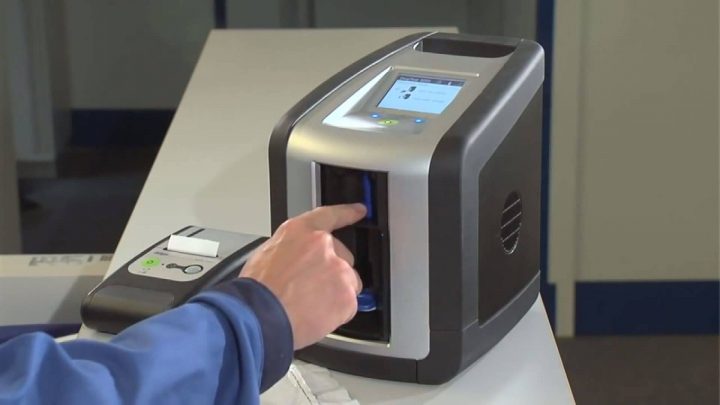It’s a new tool to help law enforcement sniff out if someone’s high on drugs behind the wheel. The Dräger DrugTest 5000 has been distributed to six municipal police services and nine RCMP detachments in Saskatchewan as officers begin to train to use the device.

The Saskatoon Police Service (SPS) was issued its instrument approximately two weeks ago and held a show-and-tell to demonstrate how the machine works.
“This is not an evidentiary device – so what that means is that this instrument is not the evidence that will convict someone or acquit them,” SPS Staff Sgt. Patrick Barbar said.
“It’s only to let officers know whether they need to go further with their investigation.”
In late August, the Dräger DrugTest 5000 was the first device approved in the country by the federal government to screen for drug-impaired drivers.
It will detect if someone has cannabis in their system as well as cocaine.
Here’s how it works: a saliva swab is collected from the person then popped into the machine. From there, it takes the instrument four minutes to analyze before the results blink on the screen and a paper record is printed off for documentation.

Get daily National news
While it’s still unclear how much of a problem drug-impaired driving is on Saskatchewan roadways, Saskatchewan Government Insurance (SGI) spokesperson Tyler McMurchy said it’s reassuring to know there’s another mechanism to catch motorists that don’t plan for a safe ride home.
“It’s never been a worse time to be an impaired driver and it’s never been harder to get away with it.”
Given the amount of time it takes to conduct a test and the limitation of the devices, Barbar said it’s likely they will only be used in the event where a field sobriety test isn’t an option, i.e. the motorist is in a cast, a lack of mobility or the individual has been hospitalized after a crash.
“Our goal is not to test as many drivers as possible on this instrument,” Barbar said.
“We plan to rely heavily still on the standardized field sobriety tests. The main reason for that is this detects two drugs, our standardized field sobriety detects a whole gamut of drugs.”
In Norway, the number of drug-impaired drivers detected by police doubled with the device, but 10 per cent of the results were false positives. The instrument is sensitive when used in cold weather, it can’t be tilted and its reliability has been questioned.
SPS admitted it has never left the station, and the 10 people it was used on during its trial were completely sober.
“It’s the only approved instrument in Canada for what it does,” Barbar said.
“Everybody anticipates with this as with any new law that it will be challenged – that’s the nature of our court system, it’s adversarial.”
The device cannot be administered at random – an officer will need reasonable grounds to conduct the test which was a concern among medicinal marijuana users.
If people refuse to provide a sample, police said it’s considered an offence that could have criminal consequences.



Comments
Want to discuss? Please read our Commenting Policy first.